外研版英语八年级下Revision B of Module 6-10课件(31张PPT无素材)
文档属性
| 名称 | 外研版英语八年级下Revision B of Module 6-10课件(31张PPT无素材) |
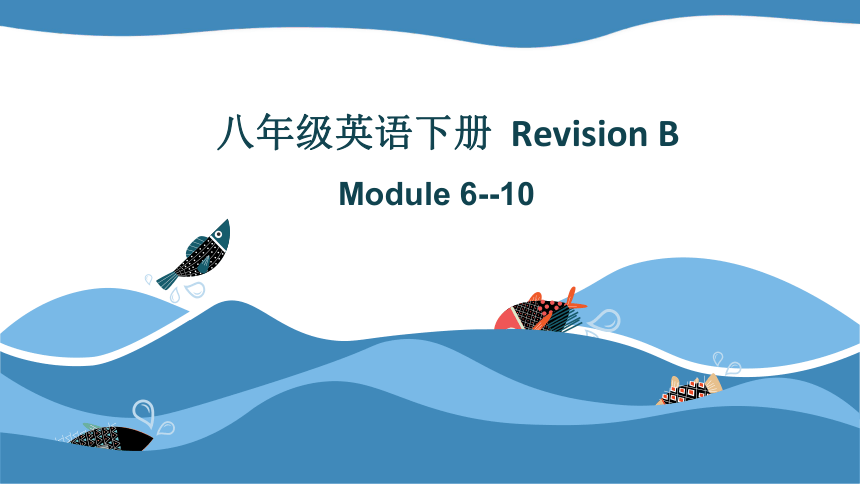
|
|
| 格式 | zip | ||
| 文件大小 | 5.0MB | ||
| 资源类型 | 教案 | ||
| 版本资源 | 外研版 | ||
| 科目 | 英语 | ||
| 更新时间 | 2020-08-01 22:56:38 | ||
图片预览

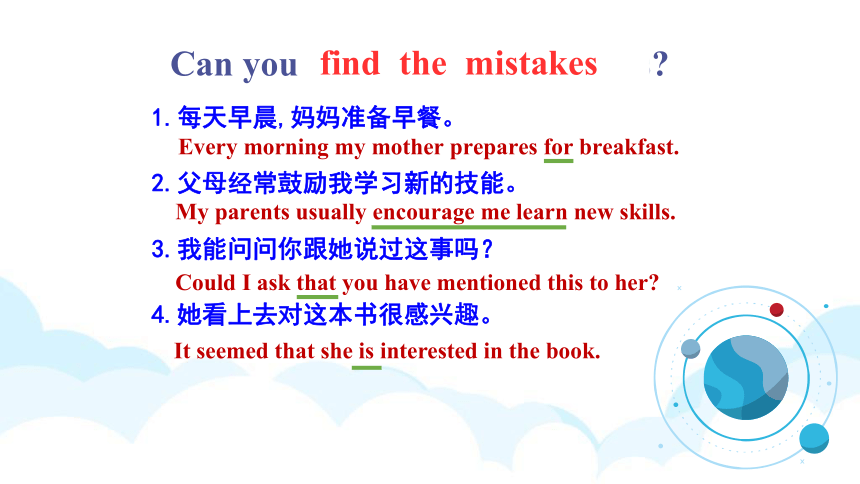

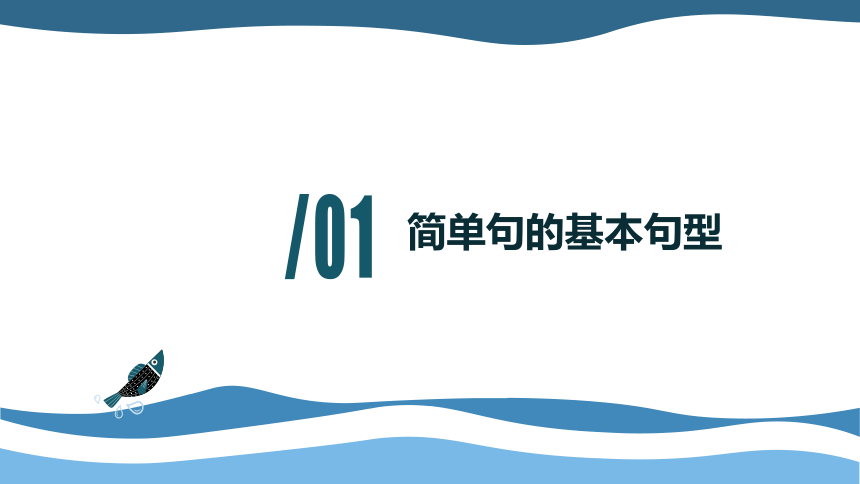
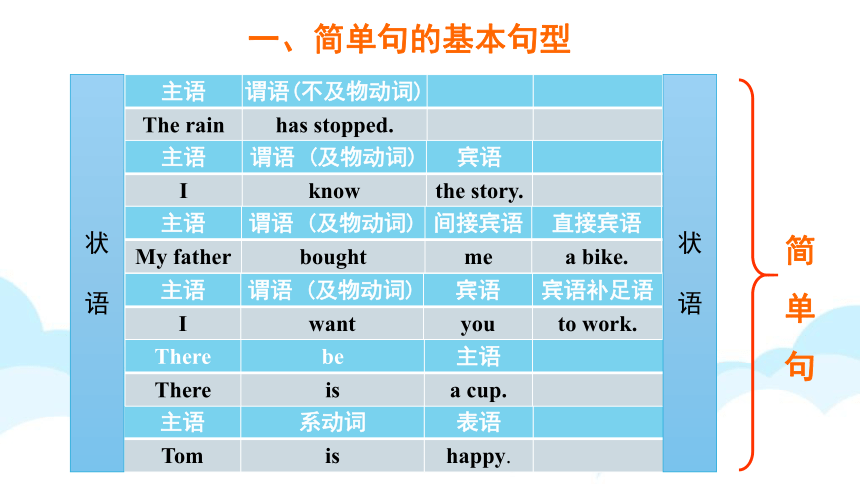
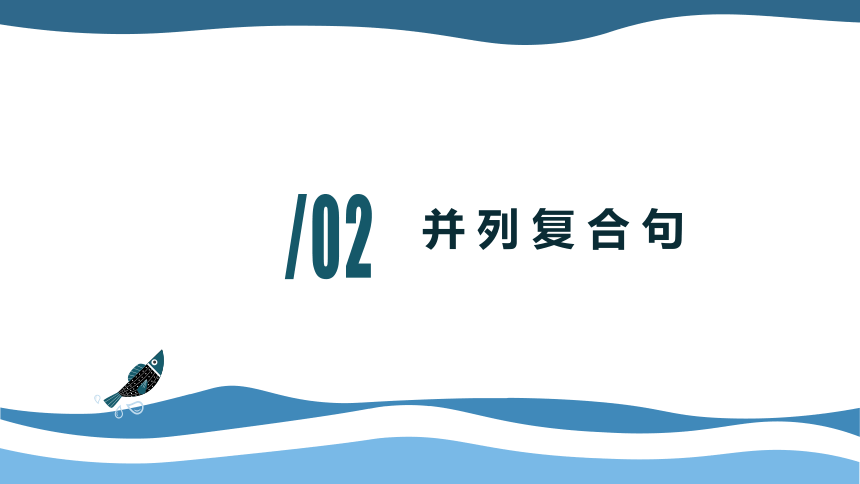
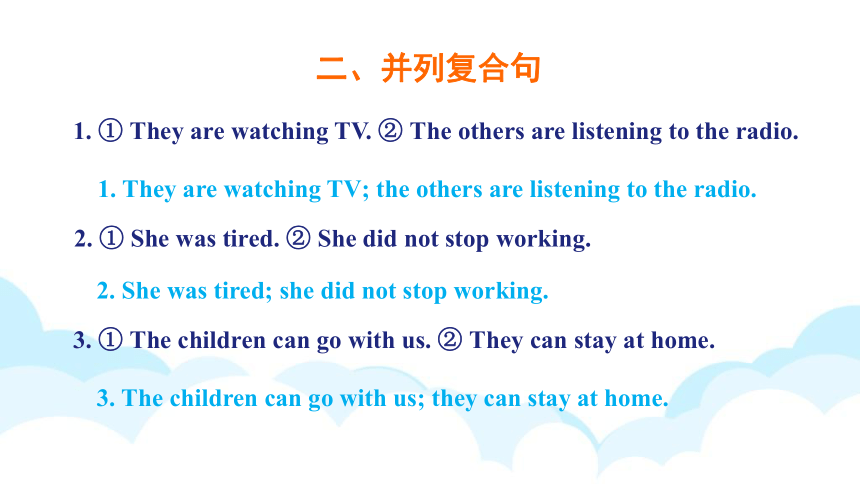
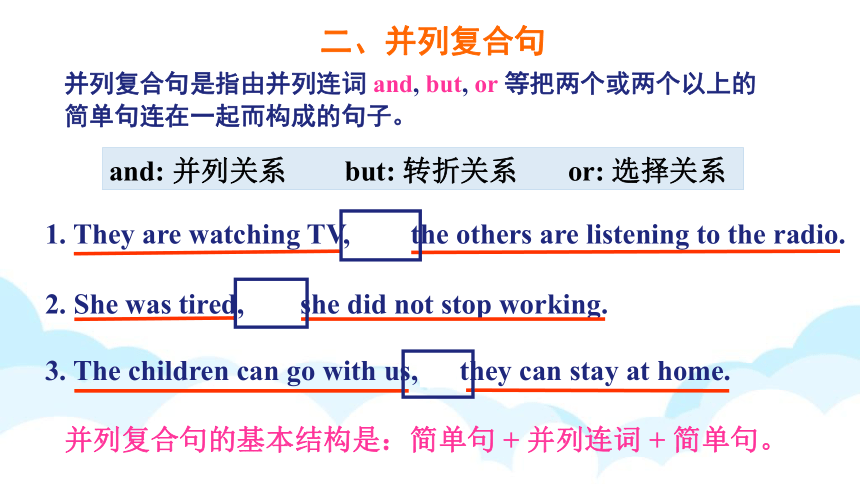
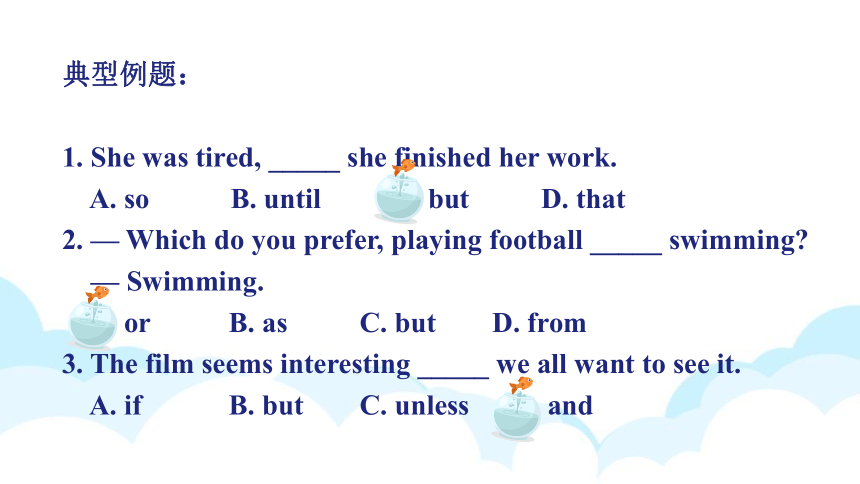
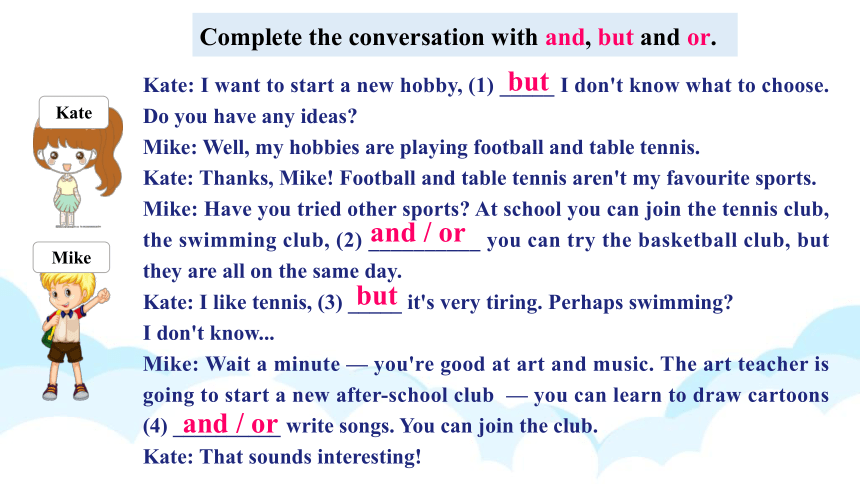
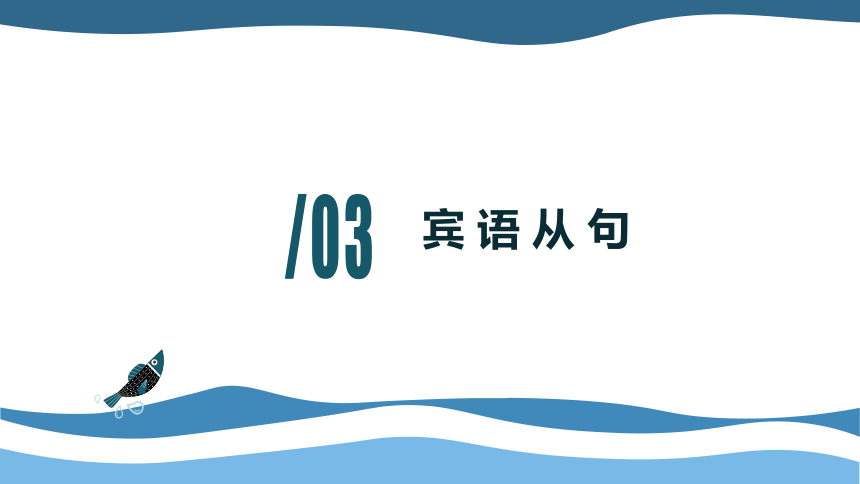
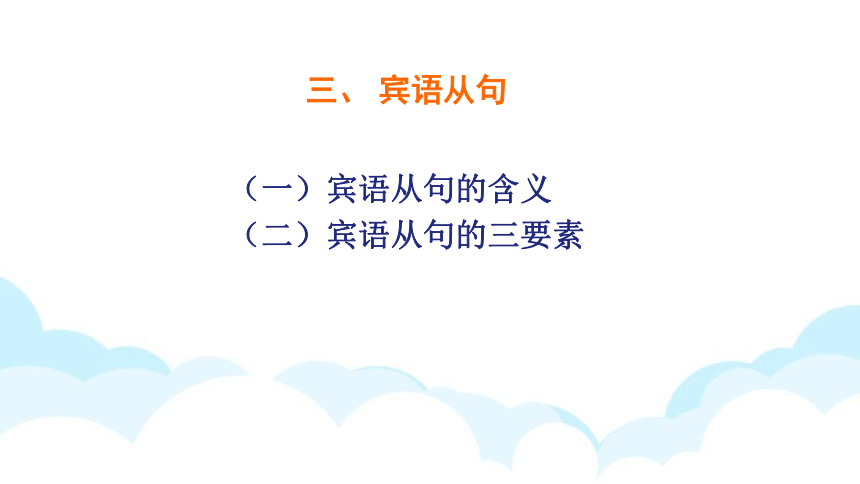
文档简介
(共31张PPT)
八年级英语下册
Revision
B
Module
6--10
1.每天早晨,妈妈准备早餐。
2.父母经常鼓励我学习新的技能。
3.我能问问你跟她说过这事吗?
4.她看上去对这本书很感兴趣。
Can
you
translate
the
sentences?
find
the
mistakes
Every
morning
my
mother
prepares
for
breakfast.
My
parents
usually
encourage
me
learn
new
skills.
Could
I
ask
that
you
have
mentioned
this
to
her?
It
seemed
that
she
is
interested
in
the
book.
Let’s
review!
一、简单句的基本句型
二、并列复合句
三、宾语从句
简单句的基本句型
/01
主语
谓语(不及物动词)
The
rain
has
stopped.
主语
谓语
(及物动词)
宾语
I
know
the
story.
主语
谓语
(及物动词)
间接宾语
直接宾语
My
father
bought
me
a
bike.
主语
谓语
(及物动词)
宾语
宾语补足语
I
want
you
to
work.
hard.
主语
系动词
表语
Tom
is
happy.
There
be
主语
There
is
a
cup.
状
语
简
单
句
一、简单句的基本句型
状
语
并
列
复
合
句
/02
1.
①
They
are
watching
TV.
②
The
others
are
listening
to
the
radio.
3.
①
The
children
can
go
with
us.
②
They
can
stay
at
home.
2.
①
She
was
tired.
②
She
did
not
stop
working.
二、并列复合句
1.
They
are
watching
TV;
the
others
are
listening
to
the
radio.
3.
The
children
can
go
with
us;
they
can
stay
at
home.
2.
She
was
tired;
she
did
not
stop
working.
1.
They
are
watching
TV,
and
the
others
are
listening
to
the
radio.
3.
The
children
can
go
with
us,
or
they
can
stay
at
home.
2.
She
was
tired,
but
she
did
not
stop
working.
and:
并列关系
but:
转折关系
or:
选择关系
并列复合句的基本结构是:简单句
+
并列连词
+
简单句。
二、并列复合句
并列复合句是指由并列连词
and,
but,
or
等把两个或两个以上的简单句连在一起而构成的句子。
典型例题:
1.
She
was
tired,
_____
she
finished
her
work.
A.
so
B.
until
C.
but
D.
that
2.
—
Which
do
you
prefer,
playing
football
_____
swimming?
—
Swimming.
A.
or
B.
as
C.
but
D.
from
3.
The
film
seems
interesting
_____
we
all
want
to
see
it.
A.
if
B.
but
C.
unless
D.
and
Kate:
I
want
to
start
a
new
hobby,
(1)
_____
I
don't
know
what
to
choose.
Do
you
have
any
ideas?
Mike:
Well,
my
hobbies
are
playing
football
and
table
tennis.
Kate:
Thanks,
Mike!
Football
and
table
tennis
aren't
my
favourite
sports.
Mike:
Have
you
tried
other
sports?
At
school
you
can
join
the
tennis
club,
the
swimming
club,
(2)
__________
you
can
try
the
basketball
club,
but
they
are
all
on
the
same
day.
Kate:
I
like
tennis,
(3)
_____
it's
very
tiring.
Perhaps
swimming?
I
don't
know...
Mike:
Wait
a
minute
—
you're
good
at
art
and
music.
The
art
teacher
is
going
to
start
a
new
after-school
club
—
you
can
learn
to
draw
cartoons
(4)
__________
write
songs.
You
can
join
the
club.
Kate:
That
sounds
interesting!
Kate
Mike
Complete
the
conversation
with
and,
but
and
or.
but
and
/
or
but
and
/
or
宾
语
从
句
/03
(一)宾语从句的含义
(二)宾语从句的三要素
三、
宾语从句
宾语从句:放在动词后面作宾语的句子。
(一)宾语从句的含义
宾语从句
主语
谓语(及物动词)
宾语
I
know
the
story.
I
know
who
she
is.
1.宾语从句的引导词
2.宾语从句的时态
3.宾语从句的语序
(二)
宾语从句的三要素
(1)that引导的宾语从句
(2)whether/if引导的宾语从句
(3)疑问词引导的宾语从句
1.
宾语从句的引导词
I
hope
(that)
it
will
snow
this
winter.
(1)that引导的宾语从句
I
believe
(that)
we
shall
become
good
friends.
③
Betty
认为树可以改善空气质量。
Betty
thinks
(that)
trees
can
improve
the
air.
当谓语动词表示肯定的概念,如“希望”“相信”
“知道”或“说”时,其后面的句子一般用that引导。
①
我希望今年冬天会下雪。
②
我相信我们会成为好朋友。
常接that
引导的宾语从句的谓语动词有:believe,
expect,
explain,
feel,
hear,
hope,
imagine,
prefer,
promise,
report,
say,
see,
tell,
think,
understand,
warn,
wish
等。
例如:
②
他不知道他们周六是否会去植树。
He
does
not
know
whether
they
will
plant
trees
on
Saturday
or
not.
(2)whether/if引导的宾语从句
①
他问周日我们是否会去钓鱼。
He
asks
whether/if
we
will
go
fishing
on
Sunday.
①
他们还没有决定到什么地方去度假。
They
have
not
decided
where
they
should
go
for
the
holiday.
(3)疑问词引导的宾语从句
②
你知道我们什么时候开运动会吗?
Do
you
know
when
we
will
hold
the
sports
meeting?
③
你知道她将离开多久吗?
Do
you
know
how
long
she
will
be
away?
when
/
where
/
how
/
why
/
who
/
how
much
/
how
long...
Last
night
I
had
a
very
strange
dream.
I
dreamt
I
met
an
alien!
I
asked
him
(1)
________
he
was
from
and
(2)
_____he
was
here.
He
told
me
(3)
______
he
was
from
Mars
and
he
won
a
competition
to
visit
the
earth.
I
asked
him
(4)
_________
he
was
and
he
told
me
he
was
500
years
old.
Then
I
asked
him
(5)
__________
he
was
going
to
stay
on
the
earth
and
(6)
______
he
was
going
back
to
Mars.
He
said
he
did
not
know.
He
asked
me
(7)
____
I
would
like
to
visit
Mars
one
day.
Then
I
heard
my
mum
calling
me.
“Wake
up,
William.
Time
for
school!”
What
a
strange
dream!
how
long
how
old
if
that
when
where
why
how
long
when
that
why
where
if
how
old
Practice
(1)当主句是现在时态时,从句可以根据实际情况选择不同时态。
(2)当主句是过去时态时,从句一般使用相应的过去时态。
(3)当从句叙述的是真理、实际情况或经常发生的事情时,即使主句
的谓语动词为过去时态,从句的谓语动词仍要保留一般现在时。
2.
宾语从句的时态
2.
宾语从句的时态
①
他想知道明天Tom是否会来。
He
wants
to
know
whether/if
Tom
________
tomorrow.
②
我们以为有人在走动。
We
thought
somebody
___________
about.
③
我们的老师告诉我们月亮绕着地球转。
Our
teacher
told
us
that
the
moon
_____
around
the
earth.
will
come
was
moving
goes
I
am
really
looking
forward
to
going
to
China.
I
am
sure
that
it
(1)
___________________
(be)
the
trip
of
a
lifetime.
I
have
never
been
on
a
long
journey
before,
but
I
think
that
I
(2)
___________
(enjoy)
it.
My
friend
Lingling
(3)
______
(tell)
me
that
I
could
go
to
school
with
her.
I
am
learning
Chinese,
but
I
am
not
sure
that
I
(4)
______________
(understand)
what
the
teacher
says.
And
do
you
want
to
know
why
I
am
going
to
China?
Well,
to
eat
all
the
delicious
food,
of
course!
Complete
the
passage
with
the
correct
form
of
the
words
in
brackets.
will
be
/
is
going
to
be
told
will
enjoy
will
understand
他问我们怎样才能为保护环境出力。
He
asks
how
we
can
help
protect
the
environment.
3.
宾语从句的语序
宾语从句用陈述句语序。
善用排除法!
典型例题:
I'd
like
to
know
_______.
A.
when
will
he
give
back
the
tape
B.
whether
has
he
received
higher
education
C.
that
he
has
been
busy
D.
whether
she
will
join
in
our
English
Evening
Practice
1.每天早晨,妈妈准备早餐。
Every
morning
my
mother
prepares
for
breakfast.
My
parents
usually
encourage
me
learn
new
skills.
Could
I
ask
that
you
have
mentioned
this
to
her?
It
seemed
that
she
is
interested
in
the
book.
Let's
correct
the
mistakes.
2.父母经常鼓励我学习新的技能。
3.我能问问你跟她说过这事吗?
4.她看上去对这本书很感兴趣。
to
∨
if/whether
was
上周日下午,你去合肥图书馆读书,发现了一些不文明的现象。请根据以下提示点,写写你的经历和感受。
(1)在图书馆二楼,有一个四岁的小男孩,大声喧哗、跑跳;
(2)他的妈妈没有阻止他,就在一旁大声地接打电话;
(3)你走过去,告诉他这样做是不对的,小男孩表示歉意后悄悄回到了座位;
(4)对此现象,你的感受和想法......
参考词汇:some
uncivilized
phenomena
一些不文明现象
要求:词数:60-80词;要点齐全,行文连贯,适当发挥。
四、实践应用
(1)在图书馆二楼,有一个四岁的小男孩。
(2)他的妈妈没有阻止他,就在一旁大声地接打电话。
(3)我走过去,告诉他这样做是不对的。
(4)小男孩表示歉意后悄悄回到了座位。
四、实践应用
(1)在图书馆二楼,有一个四岁的小男孩。
(2)他的妈妈没有阻止他,就在一旁大声地接打电话。
There
was
a
four-year-old
boy
on
the
second
floor
in
the
library.
His
mother
didn't
stop
him
and
talked
on
the
phone
loudly.
四、实践应用
(3)我走过去,告诉他这样做是不对的。
I
walked
towards
the
boy.
I
told
him
that
it
was
wrong
to
do
so.
四、实践应用
③
I
walked
towards
the
boy,
and
(I)
told
him
that
it
was
wrong
to
do
so.
④
I
walked
towards
the
boy
and
told
him
not
to
do
so.
⑤
I
walked
towards
the
boy
and
told
him
the
rules
in
the
library..
I
told
the
boy
that
we
mustn't
talk
loudly
in
the
library.
②
I
walked
towards
the
boy;
I
told
him
that
it
was
wrong
to
do
so.
①
The
boy
said
“sorry”.
He
went
back
to
his
seat
quietly.
四、实践应用
(4)小男孩表示歉意后悄悄回到了座位。
②
The
boy
was
sorry.
He
went
back
to
his
seat
quietly.
③
The
boy
said
“sorry”
and
he
went
back
to
his
seat
quietly.
④
The
boy
said
that
he
was
sorry
and
went
back
to
his
seat
quietly.
Thanks
for
your
listening
Made
by
ZYF
八年级英语下册
Revision
B
Module
6--10
1.每天早晨,妈妈准备早餐。
2.父母经常鼓励我学习新的技能。
3.我能问问你跟她说过这事吗?
4.她看上去对这本书很感兴趣。
Can
you
translate
the
sentences?
find
the
mistakes
Every
morning
my
mother
prepares
for
breakfast.
My
parents
usually
encourage
me
learn
new
skills.
Could
I
ask
that
you
have
mentioned
this
to
her?
It
seemed
that
she
is
interested
in
the
book.
Let’s
review!
一、简单句的基本句型
二、并列复合句
三、宾语从句
简单句的基本句型
/01
主语
谓语(不及物动词)
The
rain
has
stopped.
主语
谓语
(及物动词)
宾语
I
know
the
story.
主语
谓语
(及物动词)
间接宾语
直接宾语
My
father
bought
me
a
bike.
主语
谓语
(及物动词)
宾语
宾语补足语
I
want
you
to
work.
hard.
主语
系动词
表语
Tom
is
happy.
There
be
主语
There
is
a
cup.
状
语
简
单
句
一、简单句的基本句型
状
语
并
列
复
合
句
/02
1.
①
They
are
watching
TV.
②
The
others
are
listening
to
the
radio.
3.
①
The
children
can
go
with
us.
②
They
can
stay
at
home.
2.
①
She
was
tired.
②
She
did
not
stop
working.
二、并列复合句
1.
They
are
watching
TV;
the
others
are
listening
to
the
radio.
3.
The
children
can
go
with
us;
they
can
stay
at
home.
2.
She
was
tired;
she
did
not
stop
working.
1.
They
are
watching
TV,
and
the
others
are
listening
to
the
radio.
3.
The
children
can
go
with
us,
or
they
can
stay
at
home.
2.
She
was
tired,
but
she
did
not
stop
working.
and:
并列关系
but:
转折关系
or:
选择关系
并列复合句的基本结构是:简单句
+
并列连词
+
简单句。
二、并列复合句
并列复合句是指由并列连词
and,
but,
or
等把两个或两个以上的简单句连在一起而构成的句子。
典型例题:
1.
She
was
tired,
_____
she
finished
her
work.
A.
so
B.
until
C.
but
D.
that
2.
—
Which
do
you
prefer,
playing
football
_____
swimming?
—
Swimming.
A.
or
B.
as
C.
but
D.
from
3.
The
film
seems
interesting
_____
we
all
want
to
see
it.
A.
if
B.
but
C.
unless
D.
and
Kate:
I
want
to
start
a
new
hobby,
(1)
_____
I
don't
know
what
to
choose.
Do
you
have
any
ideas?
Mike:
Well,
my
hobbies
are
playing
football
and
table
tennis.
Kate:
Thanks,
Mike!
Football
and
table
tennis
aren't
my
favourite
sports.
Mike:
Have
you
tried
other
sports?
At
school
you
can
join
the
tennis
club,
the
swimming
club,
(2)
__________
you
can
try
the
basketball
club,
but
they
are
all
on
the
same
day.
Kate:
I
like
tennis,
(3)
_____
it's
very
tiring.
Perhaps
swimming?
I
don't
know...
Mike:
Wait
a
minute
—
you're
good
at
art
and
music.
The
art
teacher
is
going
to
start
a
new
after-school
club
—
you
can
learn
to
draw
cartoons
(4)
__________
write
songs.
You
can
join
the
club.
Kate:
That
sounds
interesting!
Kate
Mike
Complete
the
conversation
with
and,
but
and
or.
but
and
/
or
but
and
/
or
宾
语
从
句
/03
(一)宾语从句的含义
(二)宾语从句的三要素
三、
宾语从句
宾语从句:放在动词后面作宾语的句子。
(一)宾语从句的含义
宾语从句
主语
谓语(及物动词)
宾语
I
know
the
story.
I
know
who
she
is.
1.宾语从句的引导词
2.宾语从句的时态
3.宾语从句的语序
(二)
宾语从句的三要素
(1)that引导的宾语从句
(2)whether/if引导的宾语从句
(3)疑问词引导的宾语从句
1.
宾语从句的引导词
I
hope
(that)
it
will
snow
this
winter.
(1)that引导的宾语从句
I
believe
(that)
we
shall
become
good
friends.
③
Betty
认为树可以改善空气质量。
Betty
thinks
(that)
trees
can
improve
the
air.
当谓语动词表示肯定的概念,如“希望”“相信”
“知道”或“说”时,其后面的句子一般用that引导。
①
我希望今年冬天会下雪。
②
我相信我们会成为好朋友。
常接that
引导的宾语从句的谓语动词有:believe,
expect,
explain,
feel,
hear,
hope,
imagine,
prefer,
promise,
report,
say,
see,
tell,
think,
understand,
warn,
wish
等。
例如:
②
他不知道他们周六是否会去植树。
He
does
not
know
whether
they
will
plant
trees
on
Saturday
or
not.
(2)whether/if引导的宾语从句
①
他问周日我们是否会去钓鱼。
He
asks
whether/if
we
will
go
fishing
on
Sunday.
①
他们还没有决定到什么地方去度假。
They
have
not
decided
where
they
should
go
for
the
holiday.
(3)疑问词引导的宾语从句
②
你知道我们什么时候开运动会吗?
Do
you
know
when
we
will
hold
the
sports
meeting?
③
你知道她将离开多久吗?
Do
you
know
how
long
she
will
be
away?
when
/
where
/
how
/
why
/
who
/
how
much
/
how
long...
Last
night
I
had
a
very
strange
dream.
I
dreamt
I
met
an
alien!
I
asked
him
(1)
________
he
was
from
and
(2)
_____he
was
here.
He
told
me
(3)
______
he
was
from
Mars
and
he
won
a
competition
to
visit
the
earth.
I
asked
him
(4)
_________
he
was
and
he
told
me
he
was
500
years
old.
Then
I
asked
him
(5)
__________
he
was
going
to
stay
on
the
earth
and
(6)
______
he
was
going
back
to
Mars.
He
said
he
did
not
know.
He
asked
me
(7)
____
I
would
like
to
visit
Mars
one
day.
Then
I
heard
my
mum
calling
me.
“Wake
up,
William.
Time
for
school!”
What
a
strange
dream!
how
long
how
old
if
that
when
where
why
how
long
when
that
why
where
if
how
old
Practice
(1)当主句是现在时态时,从句可以根据实际情况选择不同时态。
(2)当主句是过去时态时,从句一般使用相应的过去时态。
(3)当从句叙述的是真理、实际情况或经常发生的事情时,即使主句
的谓语动词为过去时态,从句的谓语动词仍要保留一般现在时。
2.
宾语从句的时态
2.
宾语从句的时态
①
他想知道明天Tom是否会来。
He
wants
to
know
whether/if
Tom
________
tomorrow.
②
我们以为有人在走动。
We
thought
somebody
___________
about.
③
我们的老师告诉我们月亮绕着地球转。
Our
teacher
told
us
that
the
moon
_____
around
the
earth.
will
come
was
moving
goes
I
am
really
looking
forward
to
going
to
China.
I
am
sure
that
it
(1)
___________________
(be)
the
trip
of
a
lifetime.
I
have
never
been
on
a
long
journey
before,
but
I
think
that
I
(2)
___________
(enjoy)
it.
My
friend
Lingling
(3)
______
(tell)
me
that
I
could
go
to
school
with
her.
I
am
learning
Chinese,
but
I
am
not
sure
that
I
(4)
______________
(understand)
what
the
teacher
says.
And
do
you
want
to
know
why
I
am
going
to
China?
Well,
to
eat
all
the
delicious
food,
of
course!
Complete
the
passage
with
the
correct
form
of
the
words
in
brackets.
will
be
/
is
going
to
be
told
will
enjoy
will
understand
他问我们怎样才能为保护环境出力。
He
asks
how
we
can
help
protect
the
environment.
3.
宾语从句的语序
宾语从句用陈述句语序。
善用排除法!
典型例题:
I'd
like
to
know
_______.
A.
when
will
he
give
back
the
tape
B.
whether
has
he
received
higher
education
C.
that
he
has
been
busy
D.
whether
she
will
join
in
our
English
Evening
Practice
1.每天早晨,妈妈准备早餐。
Every
morning
my
mother
prepares
for
breakfast.
My
parents
usually
encourage
me
learn
new
skills.
Could
I
ask
that
you
have
mentioned
this
to
her?
It
seemed
that
she
is
interested
in
the
book.
Let's
correct
the
mistakes.
2.父母经常鼓励我学习新的技能。
3.我能问问你跟她说过这事吗?
4.她看上去对这本书很感兴趣。
to
∨
if/whether
was
上周日下午,你去合肥图书馆读书,发现了一些不文明的现象。请根据以下提示点,写写你的经历和感受。
(1)在图书馆二楼,有一个四岁的小男孩,大声喧哗、跑跳;
(2)他的妈妈没有阻止他,就在一旁大声地接打电话;
(3)你走过去,告诉他这样做是不对的,小男孩表示歉意后悄悄回到了座位;
(4)对此现象,你的感受和想法......
参考词汇:some
uncivilized
phenomena
一些不文明现象
要求:词数:60-80词;要点齐全,行文连贯,适当发挥。
四、实践应用
(1)在图书馆二楼,有一个四岁的小男孩。
(2)他的妈妈没有阻止他,就在一旁大声地接打电话。
(3)我走过去,告诉他这样做是不对的。
(4)小男孩表示歉意后悄悄回到了座位。
四、实践应用
(1)在图书馆二楼,有一个四岁的小男孩。
(2)他的妈妈没有阻止他,就在一旁大声地接打电话。
There
was
a
four-year-old
boy
on
the
second
floor
in
the
library.
His
mother
didn't
stop
him
and
talked
on
the
phone
loudly.
四、实践应用
(3)我走过去,告诉他这样做是不对的。
I
walked
towards
the
boy.
I
told
him
that
it
was
wrong
to
do
so.
四、实践应用
③
I
walked
towards
the
boy,
and
(I)
told
him
that
it
was
wrong
to
do
so.
④
I
walked
towards
the
boy
and
told
him
not
to
do
so.
⑤
I
walked
towards
the
boy
and
told
him
the
rules
in
the
library..
I
told
the
boy
that
we
mustn't
talk
loudly
in
the
library.
②
I
walked
towards
the
boy;
I
told
him
that
it
was
wrong
to
do
so.
①
The
boy
said
“sorry”.
He
went
back
to
his
seat
quietly.
四、实践应用
(4)小男孩表示歉意后悄悄回到了座位。
②
The
boy
was
sorry.
He
went
back
to
his
seat
quietly.
③
The
boy
said
“sorry”
and
he
went
back
to
his
seat
quietly.
④
The
boy
said
that
he
was
sorry
and
went
back
to
his
seat
quietly.
Thanks
for
your
listening
Made
by
ZYF
同课章节目录
- Module 1 Feelings and impressions
- Unit 1 It smells delicious.
- Unit 2 I feel nervous when I speak Chinese .
- Unit 3 Language in use
- Module 2 Experiences
- Unit 1 I've also entered lots of speaking competi
- Unit 2 They have seen the Pyramids.
- Unit 3 Language in use
- Module 3 Journey to space
- Unit 1 Has it arrived yet?
- Unit 2 We have not found life on any other planet
- Unit 3 Language in use
- Module 4 Seeing the docto
- Unit 1 I haven't done much exercise since I got m
- Unit 2 We have played football for a year now
- Unit 3 Language in use
- Module 5 Cartoons
- Unit 1 It's time to watch a cartoon.
- Unit 2 Tintin has been popular for over eighty yea
- Unit 3 Language in use
- Revision module A
- Module 6 Hobbies
- Unit 1 Do you collect anything ?
- Unit 2 Hobbies can make you grow as a person.
- Unit 3 Language in use
- Module 7 Summer in Los Angeles
- Unit 1 Please write to me and send me some photos
- Unit 2 Fill out a form and come to learn English
- Unit 3 Language in use
- Module 8 Time off
- Unit 1 I can hardly believe we are in the city ce
- Unit 2 We thought somebody was moving about
- Unit 3 Language in use
- Module 9 Friendship
- Unit 1 Could I ask if you've mentioned this to he
- Unit 2 I believe that the world is what you think
- Unit 3 Language in use
- Module 10 On the radio
- Unit 1 I hope that you can join us one day
- Unit 2 It seemed that they were speaking to me in
- Unit 3 Language in use
- Revision module B
